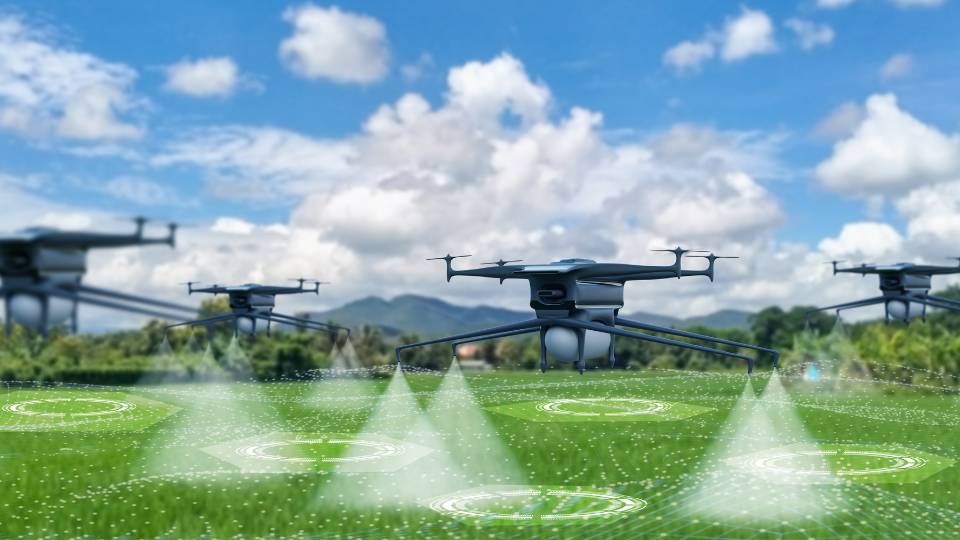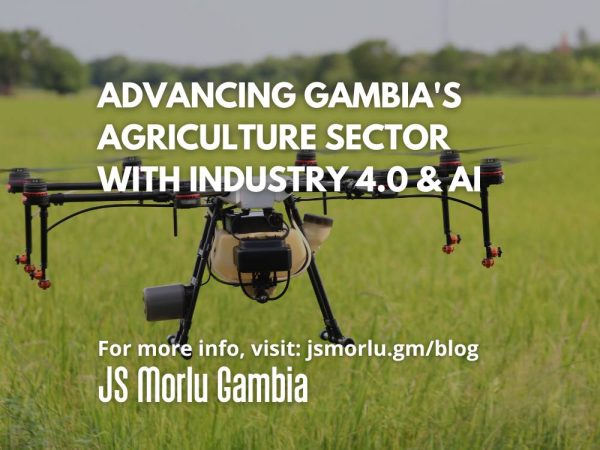The Gambia is a small country in West Africa with a population of just over 2 million people. The country’s economy is heavily reliant on agriculture, which accounts for over 25% of GDP and employs over 70% of the workforce. However, the agricultural sector in The Gambia is facing a number of challenges, including:
- Low productivity: Yields from crops such as rice, millet, and sorghum are low compared to other countries in the region.
- High dependence on rain-fed agriculture: The Gambia is a dry country with a short rainy season, which makes it difficult to grow crops without irrigation.
- High labor costs: The cost of labor in The Gambia is relatively high, which makes it difficult to compete with other countries that have lower labor costs.

Industry 4.0 and artificial intelligence (AI) can be used to address these challenges and improve the agricultural sector in The Gambia. Here are some specific examples of how these technologies can be used:
- Precision agriculture: Precision agriculture uses sensors and data analytics to improve crop yields and reduce costs. For example, sensors can be used to monitor soil moisture and nutrient levels, and data analytics can be used to identify the best time to plant and harvest crops.
- Robotics: Robots can be used to automate tasks such as planting, harvesting, and weeding. This can reduce labor costs and improve efficiency.
- AI-powered decision support systems: AI-powered decision support systems can be used to help farmers make better decisions about crop production. For example, these systems can be used to predict the weather, identify pests and diseases, and recommend the best fertilizer and pesticide applications.
The use of Industry 4.0 and AI in agriculture has the potential to revolutionize the agricultural sector in The Gambia. By improving productivity, reducing costs, and making farming more efficient, these technologies can help the country to achieve food security and economic growth.
In addition to the specific examples mentioned above, there are a number of other ways that Industry 4.0 and AI can be used to improve the agricultural sector in The Gambia. For example, these technologies can be used to:
- Develop new crop varieties that are resistant to pests and diseases.
- Improve the efficiency of irrigation systems.
- Develop new methods of storing and transporting food.
- Create new markets for agricultural products.
The use of Industry 4.0 and AI in agriculture is still in its early stages, but the potential benefits are significant. By investing in these technologies, The Gambia can position itself to become a leader in the global agricultural sector.
Here are some examples of African countries that are having success with Industry 4.0 and AI in the agriculture industry:
- Kenya: Kenya is one of the leading countries in Africa in terms of the adoption of Industry 4.0 technologies in the agriculture industry. The government has invested heavily in these technologies, and there are a number of successful startups in Kenya that are using them. For example, the company Twiga Foods is using AI to improve the efficiency of its food distribution network. Another example is the company iCow, which uses AI to provide farmers with information on animal health and nutrition.
- Tanzania: Tanzania is another country in Africa that is making progress in the adoption of Industry 4.0 technologies in the agriculture industry. The government has launched a number of initiatives to promote the use of these technologies, and there are a number of successful startups in Tanzania that are using them. For example, the company Agrovet Africa is using AI to develop new crop varieties that are resistant to pests and diseases. Another example is the company Kilimo Salama, which uses AI to provide farmers with insurance against crop failure.
- Ghana: Ghana is a developing country in Africa with a strong agricultural sector. The government has invested heavily in agriculture, and the country is home to a number of successful startups that are using Industry 4.0 technologies to improve the efficiency of the agricultural sector. For example, the company Farmerline is using AI to provide farmers with information on market prices, weather forecasts, and crop advice. Another example is the company CropLife Africa, which is using AI to develop new crop varieties that are resistant to pests and diseases.
These are just a few examples of African countries that are having success with Industry 4.0 and AI. These countries are providing a roadmap for other African countries that are looking to adopt these technologies.
The Gambia can learn from the experiences of these countries and adopt Industry 4.0 and AI technologies to improve its agricultural sector. By doing so, the country can achieve food security, economic growth, and a better quality of life for its citizens.
